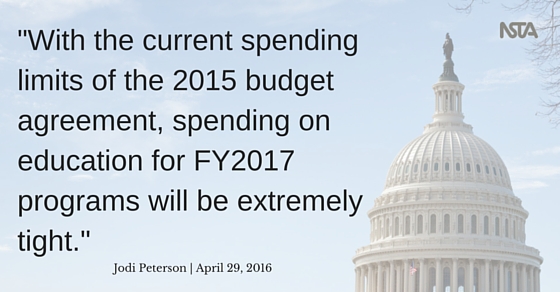Legislative Update
Teacher Appreciation Week, ESSA, and More
By Jodi Peterson
Posted on 2016-04-29
There has been a good deal of activity at the Department of Education with the ESSA and on Capitol Hill recently.
But first, a shameless plug—mark your calendars now to join NSELA (National Science Education Leadership Association) and NSTA for a joint webinar on the new federal education law–The Every Student Succeeds Act– on Wednesday, May 18, 2016. This webinar, geared for science teachers, science district leaders and administrators, will examine the new law with a focus on science/STEM education and teaching and learning. Learn about the key changes from No Child Left Behind and NCLB, where (and how) you can find and access federal dollars for science and STEM programs, and bring your questions (cause if we can’t answer them, we will find someone who will.) The webinar begins at 6:30 p.m. ET (5:30 p.m. CT / 4:30 p.m. MT / 3:30 p.m. PT. Learn more and register here.
Department of Education
May 2-6 is Teacher Appreciation Week. You can follow #ThankATeacher on social media and tell the world about your amazing students and colleagues (think selfies with students, parents and colleagues) at #WhyITeach. Tuesday, May 3 will be National Teacher Appreciation Day, and two NSTA members—Mary Colson and Steve Long—will be joining President Obama for a special ceremony honoring the Teacher of the Year at the White House that day. More on their stories next week. Access the Department of Education’s digital workbook here.
ED officials have released a STEM Funding Guidance document outlining how states, districts, and their partners can access federal funding for STEM education purposes through K-12 programs at the Department. Read more here. (Note that many of these programs are for the 2016-2017 school year under the ESEA (No Child Left Behind). ESSA is expected to be in place for the 2017 school year.)
After issuing guidance following a negotiated rulemaking session on a number of issues in the new federal education law, the Department of Education is now accepting thoughts and comments thru May 25 on possible guidance that will help the “public understand the law, how ED is interpreting the law, and to provide clarification and examples of best practices.” Some of the STEM related areas include Title II and Title IV funding. The department is accepting input until May 25 at ESSA.guidance@ed.gov
Update on Appropriations
As previously reported in the March 21 Legislative Update, NSTA is part of a new coalition that is seeking full funding ($1.65 billion) for the ESSA Title IV A, Student Support and Academic Enrichment Grants. This flexible block grant, which is authorized at $1.65 billion in FY 2017, will provide funding to districts for activities in three broad areas:
1) Providing students with a well-rounded education (e.g. college and career counseling, STEM, arts, civics, IB/AP)
2) Supporting safe and healthy students (e.g. comprehensive school mental health, drug and violence prevention, training on trauma-informed practices, health and physical education) and
3) Supporting the effective use of technology (professional development, blended learning, and devices).
Specifically, in regards to the use of Title IV A funds for STEM, districts and states can use grant monies to expand high-quality STEM courses; increase access to STEM for underserved and at risk student populations; support the participation of students in STEM nonprofit competitions (such as robotics, science research, invention, mathematics, computer science, and technology competitions); provide hands-on learning opportunities in STEM; integrate other academic subjects, including the arts, into STEM subject programs; create or enhance STEM specialty schools; integrate classroom based and afterschool and informal STEM instruction; and expand environmental education.
The President’s budget request calls for funding of only $500 million for the grants, far short of the $1.65 billion authorized by ESSA lawmakers, and suggests the funds should be competitive. Advocates, including NSTA, believe this amount is “grossly inadequate,” and is meeting with appropriations lawmakers to ensure robust funding for this program.
An Ed Week article this week discussed how the two sponsors of the new ESSA law—Reps John Kline and Bobby Scott—sent a letter to appropriators seeking more money for the new ESSA block grant.
Nearly two dozen technology companies, education companies and advocacy groups have also written a letter to appropriators urging them to fully fund the ESSA Title IV block grant. Read the letter here.
Also this week, an open letter from leading tech companies, governors, and education leaders asking for funding for computer science also ran as a full-page ad in The Washington Post and delivered on Capitol Hill.
With the current spending limits of the 2015 budget agreement, spending on education for FY2017 programs will be extremely tight. Stay tuned.
Out of School Learning and STEM
NSTA was one of the hosts for the April 28 Capitol Hill event that focused on the effectiveness of informal STEM education programs and outcomes associated with sparking student interest, engagement, motivation, and persistence in STEM education. At the event, the STEM Education Coalition released a 10-page white paper that makes the case why informal and afterschool learning must be an integral part of policies to improve STEM education across the board.
Jodi Peterson is Assistant Executive Director of Legislative Affairs for the National Science Teachers Association (NSTA) and Chair of the STEM Education Coalition. e-mail Peterson at jpeterson@nsta.org; follow her on Twitter at @stemedadvocate.
The mission of NSTA is to promote excellence and innovation in science teaching and learning for all.
Follow NSTA
Disclaimer: The views expressed in this blog post are those of the author(s) and do not necessarily reflect the official position of the National Science Teaching Association (NSTA).



